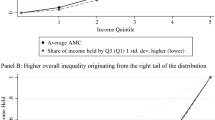Abstract
The 1980s and 1990s have been decades of quitegood economic growth in North America and muchof Western Europe. But how have the fruits ofgrowth been shared? This paper reviews changingincome distributions in the U.S., Germany and theNetherlands. These three countries may be takenas exemplars and leading economic performers in``the three worlds of welfare capitalism''(Esping-Andersen, 1990). The U.S. is a liberalwelfare-capitalist state, Germany a corporatiststate, and the Netherlands (less clearly) asocial democratic welfare-capitalist state. Thepaper focuses particularly on income changes inthe bottom, middle and top quintiles and takesa ten year period into account.Previous analyses have shown that labor andmarket income dispersion are increasing, withincreased returns to human capital. Thepotential impact of government through thetax-transfer system has been largely ignored.All three governments redistribute income fromthe rich to the poor. However, the paper showsthat only the Dutch government hasredistributed sufficiently to ensure that thebottom quintile has gained along with others.In Germany and the U.S. the poorest quintile wasconsiderably worse off in absolute terms at theend of the decade.than the beginning. TheGerman government somewhat counteracted thetrend towards greater income dispersion byredistributing to the poorest quintile, so theloss of market income was partly compensated. In the U.S. the impact of government on thepoorest quintile stayed about the same, so thisgroup ended up with about the same decrease indisposable income as market income.The U.S., Germany and the Netherlands are theonly three countries for which ten or moreconsecutive years of panel data are available.The data come from the PSID-GSOEP EquivalentFile 1980-97 and from a comparable fileconstructed from the Dutch SEP data.
Similar content being viewed by others
REFERENCES
Atkinson, A. B.: 1999, Is rising inequality inevitable? A critique of the transatlantic consensus (UNU World Institute for Development Economics Research, WIDER Annual Lecture).
Atkinson, A. B.: 1998, Poverty in Europe (Malden, Mass, Blackwell).
Burtless, G.: 1995, ‘International trade and the rise of earnings inequality’, Journal of Economic Literature 33, pp. 800-816.
Cornell University, Department of Policy Analysis and Management and the German Institute for Economic Research (DIW): 1999, GSOEP-PSID-SLID Equivalent File 1980–97 (Cornell University).
Dirven, H. J.: 1996, ‘Income dynamics, persistent poverty and welfare regimes’, European research Conference on ‘European Societies or Europe Society’ (Blarney, Ireland, March 26–31).
Economist, The: (May 20, 2000), Out of sight, out of mind.
Esping-Andersen, G.: 1990, The three worlds of welfare capitalism (Polity, Oxford).
Goodin, R. E., B.W. Headey, R. Muffels and H. J. Dirven: 1999, The three worlds of welfare capitalism (Cambridge U.P., Cambridge).
Headey, B.W., R. E. Goodin, R. Muffels and H. J. Dirven: 2000, Is there a tradeoff between economics efficiency and a generous welfare state? A comparison of best cases of ‘the three worlds of welfare-capitalism’, Social Indicators Research 50, pp. 115-157.
Hemerijck, A. and K. van Kersbergen: 1997, ‘A miraculous model? Explaining the new politics of the welfare state in the Netherlands’, Acta Politica 23, pp. 258-280.
Kakwani, N.: 1986, Analysing redistribution policies (Cambridge U.P., Cambridge).
Kuznets, S.: 1955, ‘Economic growth and income inequality’, American Economic Review 45, pp. 1-28.
Okun, A. M.: 1975, Equality and efficiency: the big trade-off (Brookings Institution, Washington D.C.).
OECD: 1999, Economic outlook (OECD (June), Paris).
OECD: 1988–1997, Economic surveys (W. Germany, The Netherlands and the U.S.) (Gives PPP data).
Ringen, S.: 1991, ‘Households, standard of living and inequality’, Review of Income and Wealth 37, pp. 1-13.
Wilson, W. J.: April 12, 2000, ‘All boats rise, now what?’, New York Times.
Author information
Authors and Affiliations
Rights and permissions
About this article
Cite this article
Headey, B., Headey, S., Muffels, R. et al. Who Enjoys the Fruits of Growth? Impact of Governments and Markets on Living Standards in Germany, The Netherlands and the U.S.A., 1987–1996. Social Indicators Research 65, 125–144 (2004). https://doi.org/10.1023/A:1025872326552
Issue Date:
DOI: https://doi.org/10.1023/A:1025872326552



